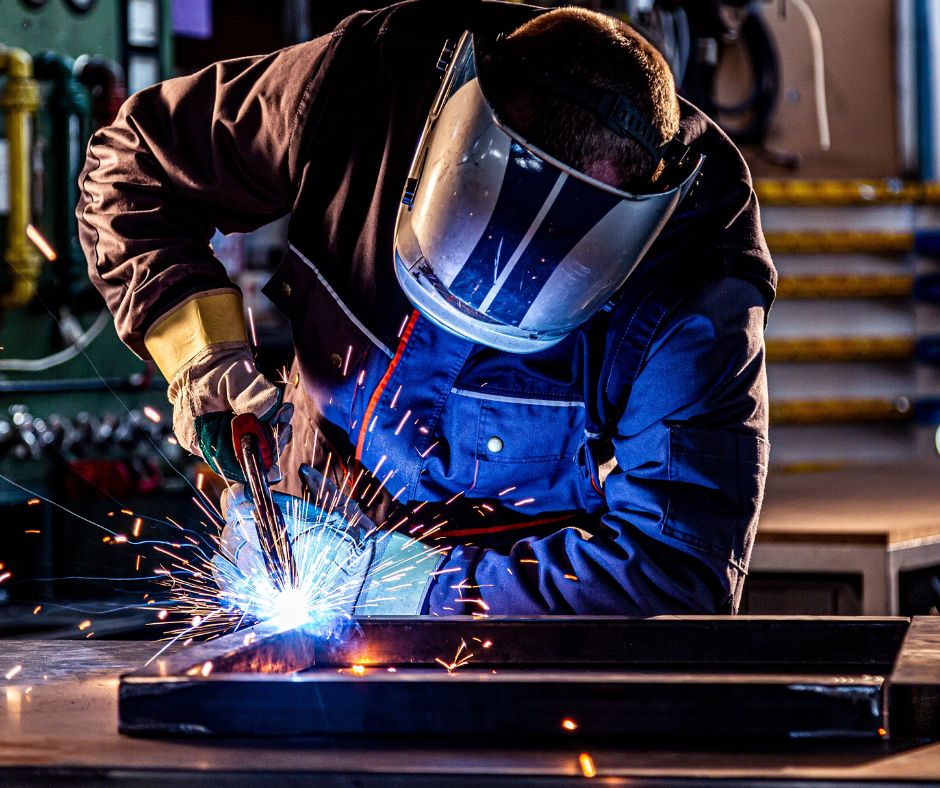Underwater welding might sound like something straight out of an action movie, but it is a real career that blends technical skill with an adventurous spirit.
In this guide, we’ll explore underwater welding, how it works, the industries that rely on it, the risks involved, and how to become an underwater welder.
What Is Underwater Welding?
Underwater welding is a specialized trade that combines two distinct skills: welding and commercial diving. Instead of working in a workshop on dry land, underwater welders perform their tasks while submerged, often in oceans, lakes, or reservoirs.
They use modified welding equipment to operate safely in wet environments, allowing them to repair, build, or maintain metal structures beneath the surface.
Underwater welding is crucial for ship repair, oil and gas, underwater construction, and infrastructure maintenance. From fixing damaged ship hulls to repairing offshore oil platforms, these welders handle jobs that are often urgent, technically challenging, and vital to safety.
How Underwater Welding Works
While the steps for underwater welding can vary depending on the project, most jobs follow a general process that ensures the weld is strong, safe, and able to withstand underwater conditions.
Site Assessment
Before welding begins, the work site is carefully inspected to help determine whether wet or dry welding is the best choice for the project. Factors like the location, repair size, and safety considerations all play a role in the decision.
Wet Welding
In wet welding, the underwater welder wears scuba or surface-supplied diving gear and uses waterproof electrodes to perform the weld directly in the water. A constant electric current keeps the welding arc stable despite the surrounding water. Because water cools the weld quickly, wet welding often requires faster work and extra attention to detail.
Dry (Hyperbaric) Welding
Dry welding uses a sealed chamber placed over the area to be repaired. This chamber is pressurized and filled with a gas mixture, creating a dry environment for the welder. Working in a dry space allows for greater precision and stronger welds, though it takes longer to set up. Welders, therefore, typically only use it for critical or long-term repairs.
How to Become an Underwater Welder
Becoming an underwater welder starts with learning the fundamentals of welding on land. Most people gain this knowledge through a welding apprenticeship or formal vocational or technical school training.
These paths help you develop essential welding skills, learn to read blueprints, and understand safety protocols before moving into more specialized areas.
Once you’ve built a solid foundation in welding, the next step is to specialize in underwater welding, which requires advanced training combining welding techniques with commercial diving skills.
Most aspiring underwater welders attend an accredited commercial diving school, where they learn how to safely perform welding tasks in challenging underwater environments.
What Are the Types of Underwater Welding Jobs?
Underwater welding isn’t a one-size-fits-all career. There are several types of jobs, each with different working conditions, locations, and goals. Some welders focus on repairs, while others work on new construction or specialized projects in extreme environments. Examples of different welding jobs include:
- Offshore oil and gas welding. Many underwater welders work on oil rigs or in open-water environments, repairing and maintaining pipelines, platforms, and underwater structures. These jobs often involve long stretches at sea and require topside and underwater work.
- Shipbuilding and repair. Welders in this area work on ships, submarines, and naval vessels. They may repair hull damage, reinforce metal structures, or perform maintenance in dry docks and underwater settings.
- Infrastructure and bridge repair. Cities and states often hire underwater welders to maintain or repair bridges, dams, locks, and other critical infrastructure that extends below the waterline.
- Salvage and recovery operations. Some underwater welders help recover sunken vessels, aircraft, or other large objects. These jobs may require cutting through damaged metal and working in hazardous environments.
Each type of job comes with its demands, schedules, and pay scale, but all require a combination of welding expertise, diving skills, and the ability to work in challenging conditions.
Is Becoming an Underwater Welder Right for You?
Underwater welding is a high-stakes, high-reward profession that requires exceptional skill, training, and courage. If you’re fascinated by the ocean, enjoy hands-on technical work, and are willing to take on challenging environments, it could be a career worth exploring.
Stratford Career Institute offers an introductory welding course to help you build foundational knowledge before pursuing specialized commercial diving and underwater welding training.
Call us to learn more or enroll online today.


